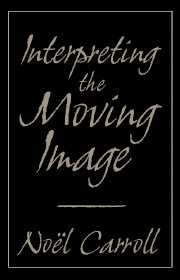Book contents
- Frontmatter
- Contents
- Foreword: Through Carroll's Looking Glass of Criticism
- Introduction
- 1 The Cabinet of Dr. Kracauer
- 2 Entr'acte, Paris and Dada
- 3 The Gold Rush
- 4 Keaton: Film Acting as Action
- 5 Buster Keaton, The General, and Visible Intelligibility
- 6 For God and Country
- 7 Lang, Pabst, and Sound
- 8 Notes on Dreyer's Vampyr
- 9 King Kong: Ape and Essence
- 10 Becky Sharp Takes Over
- 11 Interpreting Citizen Kane
- 12 The Moral Ecology of Melodrama: The Family Plot and Magnificent Obsession
- 13 Mind, Medium, and Metaphor in Harry Smith's Heaven and Earth Magic
- 14 Welles and Kafka
- 15 Nothing But a Man and The Cool World
- 16 Identity and Difference: From Ritual Symbolism to Condensation in Anger's Inauguration of the Pleasure Dome
- 17 Text of Light
- 18 Joan Jonas: Making the Image Visible
- 19 Introduction to Journeys from Berlin/1971
- 20 The Future of Allusion: Hollywood in the Seventies (and Beyond)
- 21 Back to Basics
- 22 Amy Taubin's Bag
- 23 Herzog, Presence, and Paradox
- 24 Film in the Age of Postmodernism
- Notes
- Index
23 - Herzog, Presence, and Paradox
Published online by Cambridge University Press: 05 June 2012
- Frontmatter
- Contents
- Foreword: Through Carroll's Looking Glass of Criticism
- Introduction
- 1 The Cabinet of Dr. Kracauer
- 2 Entr'acte, Paris and Dada
- 3 The Gold Rush
- 4 Keaton: Film Acting as Action
- 5 Buster Keaton, The General, and Visible Intelligibility
- 6 For God and Country
- 7 Lang, Pabst, and Sound
- 8 Notes on Dreyer's Vampyr
- 9 King Kong: Ape and Essence
- 10 Becky Sharp Takes Over
- 11 Interpreting Citizen Kane
- 12 The Moral Ecology of Melodrama: The Family Plot and Magnificent Obsession
- 13 Mind, Medium, and Metaphor in Harry Smith's Heaven and Earth Magic
- 14 Welles and Kafka
- 15 Nothing But a Man and The Cool World
- 16 Identity and Difference: From Ritual Symbolism to Condensation in Anger's Inauguration of the Pleasure Dome
- 17 Text of Light
- 18 Joan Jonas: Making the Image Visible
- 19 Introduction to Journeys from Berlin/1971
- 20 The Future of Allusion: Hollywood in the Seventies (and Beyond)
- 21 Back to Basics
- 22 Amy Taubin's Bag
- 23 Herzog, Presence, and Paradox
- 24 Film in the Age of Postmodernism
- Notes
- Index
Summary
Herzog is a filmmaker of whom it is often said that he is difficult to categorize. For example, it is common to announce that he is unique among New German Filmmakers. And, of course, the notion that Herzog is unclassifiable contributes to the myth that he has created for himself of the director identified with abnormal, extreme characters, who are at times possessed, but are generally extraordinary social misfits, or better, “nonfits.” Herzog is the visionary Fitzcarraldo, for instance, doubling his character's obsession, as the promotional material surrounding that film made abundantly clear. If the characters that Herzog creates defy classification, is it at all surprising that the director who claims he is his films should equally desire to appear resistant to cataloguing?
And yet, Herzog is not alone when seen in the context of international cinema. He falls into a group of filmmakers devoted to what might be called the primacy of experience. Stan Brakhage and Terrence Malick would also be notable representatives here. These are filmmakers concerned to acknowledge or to disclose the often ignored richness that is nevertheless believed to be always available to experience. These filmmakers share an advocacy of the immediacy of experience, that is, an avowal of the possibility of experience – or, at least, of dimensions of experience – independent from routine, social modes of schematization.
- Type
- Chapter
- Information
- Interpreting the Moving Image , pp. 284 - 299Publisher: Cambridge University PressPrint publication year: 1998

